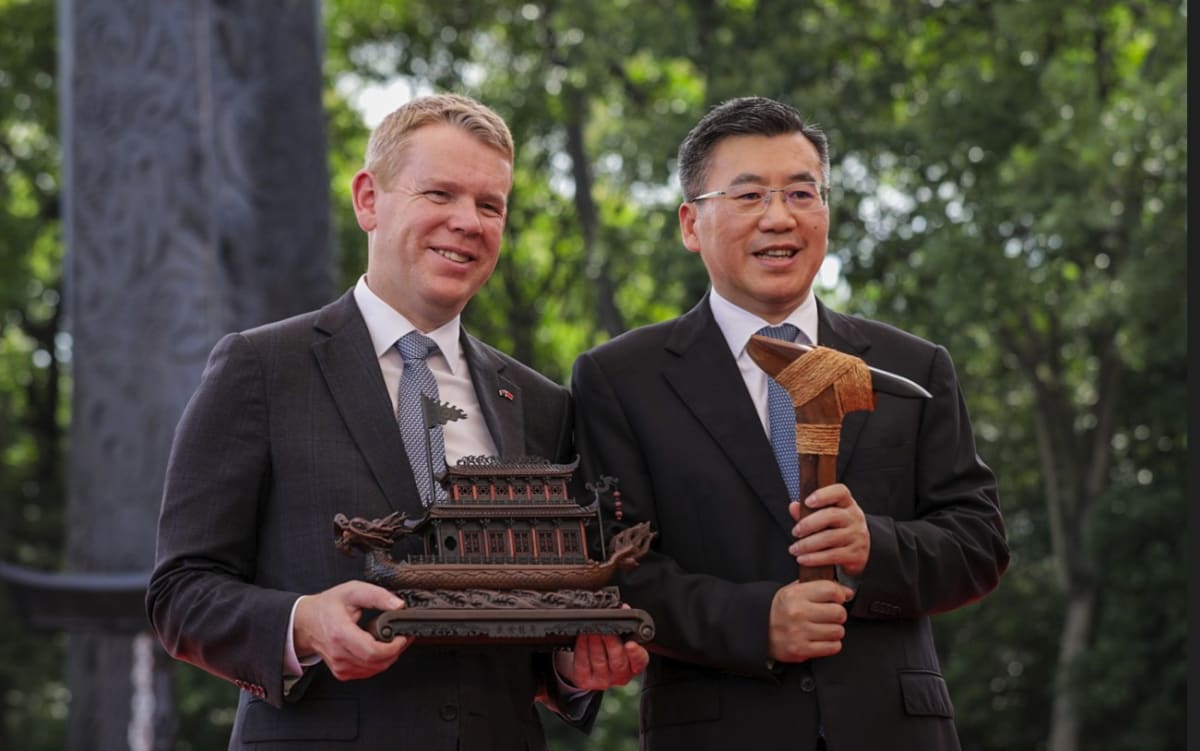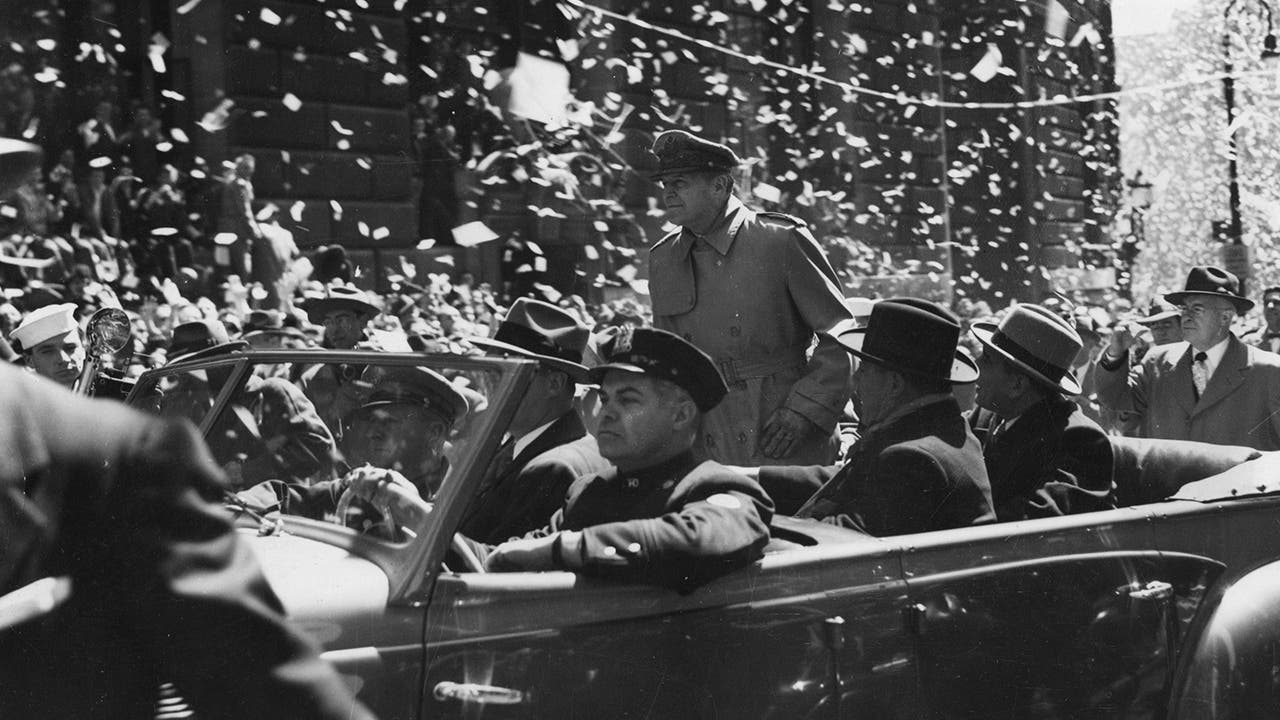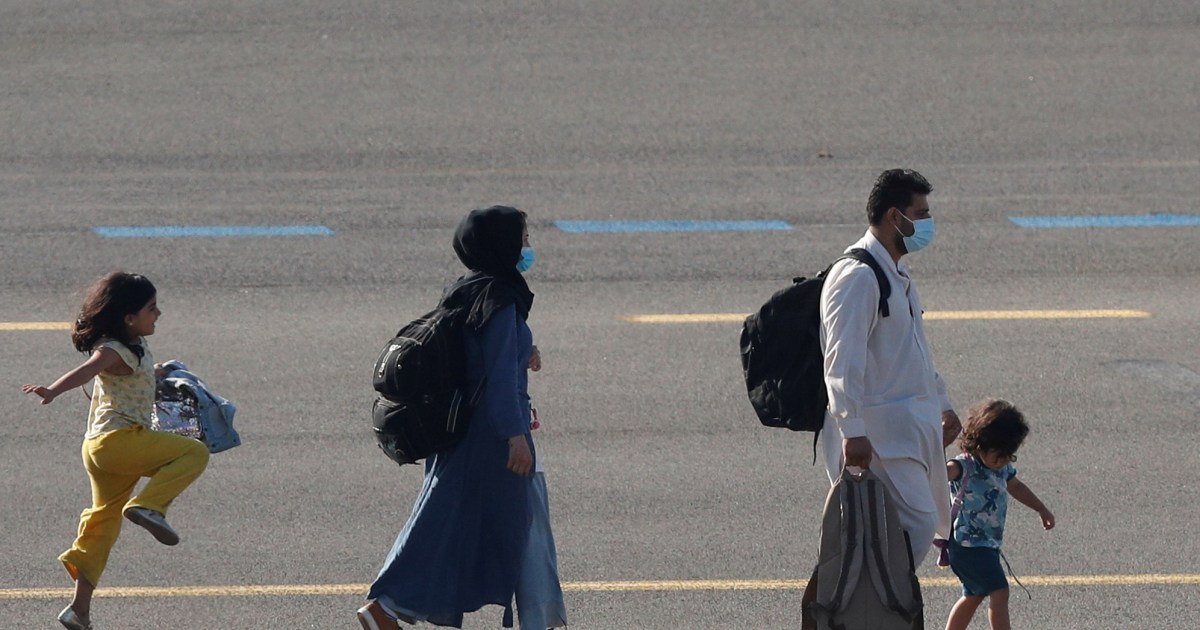Swimming in the deep end
Foreign Affairs
The “boy from the Hutt” has pinched himself at every turn from Beijing’s Great Hall of the People to the iconic Bund in Shanghai. Chris Hipkins didn’t arrive a natural diplomat, but as political editor Jo Moir observes he will leave a much better one.
Analysis: The biggest risk bringing world champion Te Matatini winners, Te Whānau a Apanui, to China was that their performance might outshine the Prime Minister’s.
Their presence on the 5-day trade and tourism marathon across China has been a breath of fresh air.
Where business events can get stuffy and delegates suffering jetlag can find themselves quietly nodding off, the kapa haka crew has turned up and hit the restart button, bringing a cultural energy and slice of home to China like never before.
At the VIP dinner at the Shangri La in Shanghai on Thursday night the group had 450 New Zealand and Chinese guests captivated as they asked the audience to recite back Māori phrases before heading out into the crowd to pick a few volunteers to take part in a haka.
The head of the Ministry of Foreign Affairs and Trade, Chris Seed, appeared to take one for the team to prevent Hipkins from getting up on the stage himself, which he almost certainly would have done if asked.
Seed – a respected diplomat and boss to many in the room – brought enthusiasm in spades to the practice session live on stage learning the various movements and words to the haka, alongside other Chinese businessman thrilled with the chance to learn something they’ve only ever seen on television or social media.
When the full haka began Seed did his best to keep up but by halfway through, he and the other volunteers were all arms and hands in all the wrong directions, which had the rest of the room (now all out of their seats and on their feet fighting for the best view) in stitches.
It was unique Kiwi culture at its best – inclusive, engaging, and wholesome.
Te Whānau a Apanui have been right on song and trade and government staffers, business leaders and the media over the course of the week have been seen and heard humming their waiata hours after they’ve left the stage.
It’s been a ruthlessly packed itinerary for all, with no room for a delay or hiccup for fear of missing a motorcade.
Navigating Beijing, Tianjin or Shanghai without the streets cleared and shut down would simply mean missing multiple events.
Every flight, meeting, and event window is narrow, and every minute is precious this week.
The half a dozen events plus travel each day has taken its toll.
Several in the business delegation spoken to by Newsroom described the week as a roaring success, but if they could offer any feedback, it was that the number of events was a bit much, especially when combined with the 30-plus degree temperatures and high humidity.
Even Hipkins has suffered from schedule-itis.
Each day has required at least three or four speeches, each to a new audience, and by late-afternoon and evening he’s been left cleaning his throat and trying but failing to rally.
Asked about his energy levels on Thursday, Hipkins said it had been a long trip, but he’d felt “very energised the whole way across the trip” and apologised if he hadn’t “conveyed that at every individual moment of it”.
There was speculation ahead of the trip that he might not bring the same star power to an international trade mission that his predecessor, Jacinda Ardern, did.
Given the business leaders on the trade mission are sacrificing a week out of their own busy work lives at home for the benefit of having doors opened that wouldn’t be otherwise, they were reliant on Hipkins doing what Ardern has done previously.
Hipkins told Newsroom he backed himself to “sell New Zealand successfully abroad”.
Those business leaders who spoke to Newsroom agreed, saying Ardern had been very good at it but Hipkins was equally delivering.
They pointed to the fact announcements and agreements had been made that would hugely benefit trade and tourism back home that wouldn’t have been signed otherwise.

While Ardern’s communication style and engagement is different to Hipkins and her reputation is on a much bigger scale, the business delegates said the way Hipkins interacts with the business community – both domestic and international – is powerful too.
Hipkins has been thrown in the deep end with this trip, and at times he’s looked uncomfortable, and at others he’s been stunned or perplexed.
But given he’s still likely coming to terms with the fact that he is the Prime Minister of New Zealand, his shock at being in the same room and considered on an equal footing, temporarily, to the likes of President Xi Jinping is somewhat justified.
Hipkins told Newsroom he pinched himself all the time about the experiences he was having, and it was a big deal for “a boy from the Hutt” but he took the responsibility of being New Zealand’s ambassador seriously.
In a country like China where tradition and custom are central, it’s not hard to do something that looks out of place or wrong.
Hipkins holding out his hands patiently waiting to receive his gift of a Chinese wooden dragon boat at the Baoshan International Folk Art Museum, only for the Chinese official to not give it to him and instead deliver a speech explaining its significance, is just one of many awkward examples where the run of events wasn’t made clear.
Small talk with strangers is not a strong suit for Hipkins either and some of the long silences with his hosts, or standing and staring at something being pointed out but not knowing exactly what to say in return isn’t uncommon for Hipkins.
But New Zealand’s trade relationships aren’t going to fall over because the Prime Minister is short of a story or an arts and culture experience to share.
One of the biggest challenges of bringing one of the biggest NZ political and trade delegations ever to go offshore is that China is still requiring a certain level of Covid protocol despite not applying it to its own people.
From departure to return, a large chunk of the delegation had to undergo four PCR tests – a nervous wait for results ensued on each occasion – and masking was extensive in Beijing.
Indoor events and anything at the Great Hall of the People required masks to be worn even though there are no specific masking rules in Beijing itself.
The reason is that Xi and those who work at the Great Hall simply don’t want to get sick and because of the self-determined importance of their work, all guests are required to pass tests and mask-up before entering.
There are other oddities too, such as the vehicles the delegations are using for transport only being able to move as a convoy.
It means when some in the delegations choose to skip an event or head somewhere on their own the full suite of vehicles still heads off to whichever event is scheduled, regardless of whether they’re needed.
On Thursday night when three journalists and four trade mission staff headed to the VIP dinner, an 18-seater bus was taken, and the other two empty 18-seater buses coasted behind completely empty simply because Chinese rules say they must.
Hipkins has almost wrapped up his time in China and told Newsroom his favourite part so far had been some “pretty good food”.
He also offered a “more serious” answer, which was the meetings with President Xi and Premier Li and the “candour and warmth” they both offered.
Given his passion for a sausage roll and Coke Zero, it’s remarkable he didn’t encounter any during his time in Beijing and Tianjin.
It was inevitable really that a “salmon sausage roll” was served at the dinner honouring him on his final night in China.




